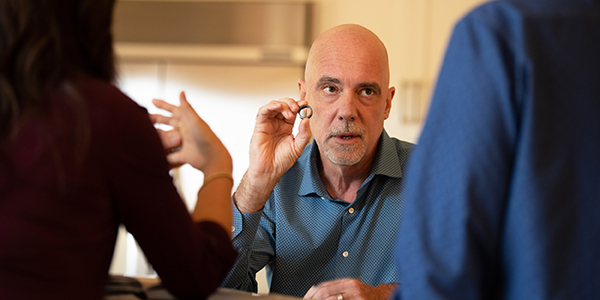Sleep Better With Wearable Tech
Getting enough sleep isn’t a luxury — it’s a necessity. When you don’t sleep well, you’re at higher risk for numerous health conditions, including Type 2 diabetes, heart disease and obesity.
“Sleep disturbance is one of the most common things we see in clinical practice,” says Eric Pifer, M.D., a primary care doctor with Sutter’s San Francisco Concierge Medicine. As many as 70 million people struggle with sleep regularly. And medicines can sometimes lead to dependence and make the entire situation worse.
How Sleep Technology Can Help
Fortunately, says Pifer, new technologies are creating “a quiet revolution” in treating insomnia and other sleep disorders. Data from smart watches, rings and even body-mapping mattress pads help clinicians design customized plans to improve your sleep.
Pifer prescribes a sleep-tracking ring to all his patients. The device measures total sleep duration, time in bed, sleep latency and, importantly, the amount of REM and deep sleep. “We find that the data correlates well with a person's report about how refreshed they feel when they wake up,” he says.

Data-Driven Solutions For Deeper Sleep
Pifer also uses sleep-device data to identify potential causes of insomnia. If he suspects sleep apnea, he may refer you to a qualified sleep specialist.
“We can scroll through the data and ask probing questions about what you were doing on nights when you experienced good and poor sleep,” he says. Those insights may lead to suggestions such as reducing caffeine, alcohol or sweets, which especially affect REM and deep sleep. “We often see improvement when someone reduces those substances, which in turn motivates them to maintain the change.”
Sleep trackers also provide guidance on sleep scheduling. “The optimal time to fall asleep is when the sleep drive is high and the circadian wakefulness drive has dropped. If you miss that ideal window, you may awaken several hours into the night,” Pifer says. Consistently waking up a couple of hours after falling asleep is a sign of a condition called wake after sleep onset (WASO). Sleep data can help assess the scheduling issue and WASO severity.
Taken together, sleep data and interviews can help identify types of insomnia, leading to more targeted treatments, which may include:
- Sleep hygiene practices
- Cognitive behavioral therapy
- Mindfulness, acupuncture and mind-body therapies
- Sleep restrictive therapy
The more you become attuned to your sleep patterns, the better you and your doctor can address any issues. With the help of sleep trackers, you’ll be well on your way to getting a good night’s rest.
Discover Similar Stories
Choose a topic below to read more stories like this one.




